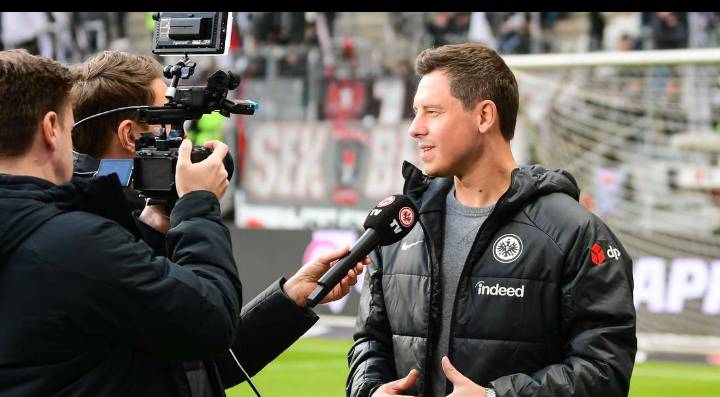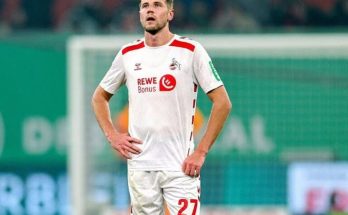Eintracht Frankfurt has always been a club where passion, unpredictability, and drama walk hand in hand. Yet the latest development coming out of the Waldstadion has shaken not only the club’s loyal supporters but the entire Bundesliga landscape. The sudden dismissal of sports director Timmo Hardung has left fans reeling, media outlets scrambling, and football insiders debating what this means for the future of one of Germany’s proudest traditional clubs. What was announced as an administrative decision has quickly spiraled into a narrative far larger than one man’s job security. The club justified the sacking with accusations of misconduct, and at the same time raised the uncomfortable question of whether Hardung, at just 34 years old, was ultimately too young and inexperienced to carry the heavy burden of shaping Eintracht’s sporting direction.
The news feels like an earthquake because Hardung was, until only weeks ago, being praised as a bold visionary, a modern thinker who understood both the business side of football and the cultural heartbeat of Frankfurt. Supporters had warmed to his image as part of a new generation of leaders unafraid to push boundaries and embrace innovation. But now, those same fans find themselves staring at a sudden void. Who will pick up the pieces? How did a figure who appeared so integral to the club’s medium-term project fall from grace so quickly?
Part of the shock comes from the timing. Eintracht Frankfurt has been enjoying a period of relative stability in recent years, marked by European nights, smart transfers, and a growing reputation abroad. While other Bundesliga clubs have wrestled with financial turmoil or management chaos, Frankfurt seemed to be charting a deliberate path forward. Hardung, alongside head coach Dino Toppmöller and the club hierarchy, was thought to be central to ensuring that Eintracht would continue competing for European football on a yearly basis. His dismissal shatters that perception of stability and instead opens the door to all manner of speculation.
The accusation of misconduct is particularly sensitive. Clubs rarely make such strong claims unless they are confident of being able to justify them. Yet Frankfurt has so far offered little detail beyond general statements, leaving journalists and fans to fill the gaps with rumors and theories. Was it an internal power struggle? A matter of personality clashes within the boardroom? Or perhaps a series of decisions on transfers and finances that went sour and undermined trust? Without clarity, the public narrative spins uncontrollably, and for a club with a passionate fanbase like Eintracht’s, that can be dangerous.
Some argue that the club’s reference to Hardung’s inexperience is telling. When he was appointed, eyebrows were raised in some corners of German football. A figure in his early thirties being handed the keys to one of the Bundesliga’s biggest sporting departments was seen by many as a gamble. For a while, it looked like a masterstroke, an emblem of Frankfurt’s willingness to embrace modern football culture and to trust in fresh ideas rather than sticking to old hierarchies. But the reality of the Bundesliga is brutal: results on the pitch, transfer markets, and locker room dynamics are unforgiving. Some insiders now suggest that Hardung may have been in over his head, unable to navigate the fierce political currents within the club while balancing the external pressures of fans and media.
On the other hand, supporters of Hardung argue this dismissal is less about incompetence or inexperience and more about a scapegoat being made. Frankfurt’s ambitions have been lofty, but not all of their recent moves have borne fruit. Transfers that were hailed as clever at the time did not always deliver the expected returns on the pitch. Coaching staff changes have led to mixed results, and the club has struggled at times to live up to the promise of consistent European qualification. In such a climate, the temptation to pin blame on a single figure is strong. Hardung, as the face of the sporting strategy, may simply have become the easiest target for frustrations.
The impact on the locker room cannot be underestimated. Players are acutely aware when the sporting leadership is in turmoil. Many of them were recruited or supported by Hardung and built personal trust with him. His sudden departure risks unsettling the sense of continuity in the squad. For young talents especially, a change in sporting director often leads to uncertainty about their future role in the team. Veterans, meanwhile, may question whether the project they bought into is still intact. This disruption comes at a delicate time of the season, when focus and unity are essential.
For the fans, the emotional fallout is equally significant. Eintracht supporters are famously loyal and vocal, but they are also highly sensitive to the direction of their club. They celebrated European triumphs not long ago, and they expect the board to act in ways that respect the club’s heritage while pushing forward. The sacking of Hardung leaves many questioning whether there is a coherent plan in place. Was he dismissed for valid reasons, or is this a sign of deeper instability within the boardroom? Such questions can erode trust and make it harder for the leadership to rally the fanbase in future.
At the same time, this moment also opens up possibilities. Some analysts view the dismissal as a chance for Frankfurt to reset and bring in a more experienced hand. With the Bundesliga becoming more competitive, especially as mid-table teams invest in new talent and infrastructure, Frankfurt may decide they need a hardened operator with proven credentials. A director with deeper experience in navigating the transfer market, securing player sales at high value, and negotiating contracts could help solidify the club’s standing. If the next appointment is successful, Hardung’s departure may be seen in hindsight as a necessary correction rather than a disaster.
Still, there is a risk that Frankfurt loses momentum. German football is increasingly a battleground for talent and resources, with Premier League and Saudi clubs poaching players, and even rival Bundesliga clubs like Bayer Leverkusen and RB Leipzig pushing aggressively. A period of instability at Frankfurt could mean missing out on key transfer opportunities or falling behind in squad planning. With the modern football calendar moving so quickly, even a few months of uncertainty can have long-term consequences.
Critics of the dismissal highlight the irony that only recently Hardung was praised as a bold experiment. Frankfurt was seen as daring to trust in youth not only on the pitch but also in management. The appointment of a young sports director was a statement about the future of German football leadership: fresh blood, modern methods, and a willingness to break from tradition. Ending that experiment so abruptly feels to many like a retreat into conservatism, a sign that the old guard within the Bundesliga remains wary of too much innovation.
This tension between tradition and innovation is part of the broader story. Frankfurt is a club that has often thrived on its underdog status, shocking larger clubs with determination and daring strategies. The Europa League victory in 2022 was a testament to that spirit. But now, the club faces a choice: does it continue to embrace bold approaches, or does it seek safety in proven experience? The dismissal of Hardung suggests the latter, but whether that choice pays off will depend heavily on who is brought in to replace him and how quickly they can steady the ship.
For Hardung himself, this episode may not spell the end of his career. On the contrary, the publicity surrounding his dismissal may actually raise his profile in the long run. Other clubs may see him as a talented young executive whose ideas simply clashed with the entrenched culture at Frankfurt. In modern football, where clubs are constantly seeking an edge, there is every chance that another organization will take a chance on him. If he learns from this experience and applies it elsewhere, he could yet emerge as one of the significant sporting directors of his generation.
The immediate future, however, belongs to Frankfurt’s board and their next moves. Transparency will be key. If the misconduct allegations are substantiated, the leadership must be forthright in presenting evidence, otherwise suspicion and resentment will fester. If, instead, the dismissal was more about performance and experience, then honesty about the reasoning would help restore trust. Clubs are increasingly learning that fans demand communication, and in a digital age, secrecy breeds backlash.
In the Bundesliga as a whole, the dismissal is a reminder of how precarious leadership positions can be. Clubs are under immense pressure to deliver results while also balancing finances, fan expectations, and long-term planning. Sports directors in particular face the impossible task of keeping everyone happy while navigating markets that are global and cutthroat. Hardung’s downfall illustrates how quickly the tide can turn, from visionary to scapegoat in the space of a single season.
As the dust settles, one thing is certain: Eintracht Frankfurt stands at a crossroads. The club can either allow this dismissal to spiral into instability or use it as a chance to redefine its sporting vision with clarity and confidence. Fans will be watching closely, eager to see whether the Eagles can rise from this internal tremor stronger than before. Whether this proves to be the end of a bold experiment or the beginning of a new chapter remains to be seen. For now, Frankfurt has reminded the Bundesliga of one uncomfortable truth: in football, nothing is permanent, and even visionaries can be swept away by the ruthless currents of the game.


